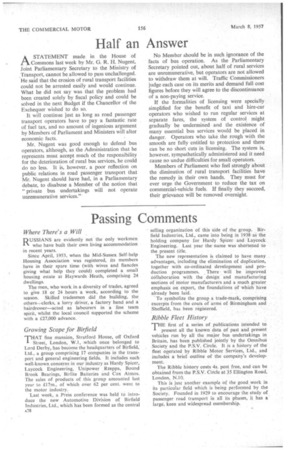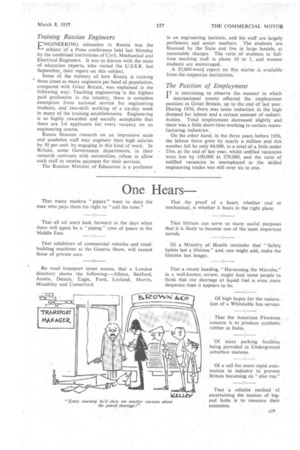Passing Comments
Page 30

Page 31

If you've noticed an error in this article please click here to report it so we can fix it.
Where There's a Will
RUSSIANS are evidently not the only workmen who have built their own living accommodation in recent years.
Since April, 1953, when the Mid-Sussex Self-help Housing Association was registered, its members have in their spare time (with wives and fianaes giving what help they could) completed a small housing estate at Haywards Heath, comprising 24 dwellings.
The men, who work in a diversity of trades, agreed to give 18 or 24 hours a week, according to the season. Skilled tradesmen did the building, the othersclerks, a lorry driver, a factory hand and a hairdresser—acted as labourers in a fine team spirit, whilst the local council supported the scheme with a £27,000 advance.
Growing Scope for Birfield
THAT fine mansion, Stratford House, off Oxford Street, London, W.1, -which once belonged to Lord Derby, has become the headquarters of Birfield, Ltd., a group comprising 17 companies in the transport and general engineering fields. It includes such well-known concerns in our industry as Hardy Spicer, Laycock Engineering, Unipower Rzeppa, Bound Brook Bearings, Birlite Batteries and Cox Atmos. The sales of products of this group amounted last year to £17m., of which over 62 per cent. went to the motor industry.
Last week, a .Press conference was held to introduce the new Automotive Division of Birfield Industries, Ltd., which has been formed as the central A28
selling organization of this side of the group. Birfield Industries, Ltd., came into being in 1938 as the holding company for Hardy Spicer and Laycock Engineering. Last year the name was shortened to the present title.
The new representation is claimed to have many advantages, including the elimination of duplication, together with co-ordinated development and production programmes. There will be improved collaboration with the design and manufacturing sections of motor manufacturers and a much greater emphasis on export, the foundations of which have already been laid.
To symbolize the group a trade-mark, comprising excerpts from the coats of arms of Birmingham and Sheffield, has been registered.
Ribble Fleet History
fHE first of a series of publications intended to present all the known data of past and present vehicles run by all the major bus undertakings in Britain, has been published jointly by the Omnibus Society and the P.S.V. Circle. It is a history of the fleet operated by Ribble Motor Services, Ltd., and includes a brief outline of the company's development.
The Ribble history costs 4s. post free, and can be obtained from the P.S.V. Circle at 35 Ellington Road, London, N.10.
This is just another example of the good work in its particular field which is being performed by the Society. Founded in 1929 to encourage the study of passenger road transport in all its phases, it has a large, keen and widespread membership.
Training Russian Engineers
ENGINEERING education in Russia was the subject of a Press conference held last Monday by the combined institutions of Civil, Mechanical and Electrical Engineers. It was to discuss with the team of education experts, who visited the U.S.S.R. last September, their report -on this subject.
Some of the mystery of how Russia is training three times as many engineers per head of population, compared with Great Britain, was explained in the following way: Teaching engineering is the highest paid profession in the country, there is complete exemption from national service for engineering students, and two-shift working of a six-day week in many of the training establishments. Engineering is so highly rewarded and socially acceptable that there are 3.6 applicants for, every vacancy on .an engineering course.
Russia finances research on an impressive scale and academic staff may augment their high salaries by so per cent. by engaging in this kind of work. In Britain, some Government departments, in their research contracts with universities, refuse to allow such staff to receive payment for their services.
The Russian Minister of Education is a professor in an engineering institute, and his staff are largely professors and senior teachers. The students are financed by the State and live in large hostels, at reasonable charges. The ratio of students to fulltime teaching staff is about 10 to 1, and women students are encouraged.
A 25,000-word report on this matter is available from the respectiye institutions.
The Position of Employment
TT is interesting to observe the manner in which
international events affected the employment position in Great Britain, up to the end of last year. During 1956, there was some reduction in the high demand for labour and a certain amount of redistribution. Total employment 'decreased slightly and there was a little short-time‘working in certain manufacturing industries.
On the other hand, in the three years before 1956, the labour force grew by nearly a million and this number fell by only 64,000, to a total of a little under • 23m. at the end of last year, whilst unfilled vacancies were less by 100,000 at 279,000, and the ratio of Unfilled vacancies to unemployed in the skilled engineering trades was still over six to one.




































































































